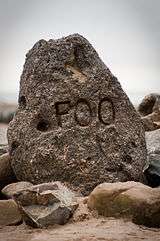Mark Foo
| Mark Foo | |
|---|---|
| Personal information | |
| Born |
February 5, 1958 Singapore |
| Died |
December 23, 1994 (aged 36) Mavericks, Half Moon Bay, California, USA |
| Surfing specifications | |
| Stance | Regular |
| Favorite waves | North Shore (Oahu) |
Mark Sheldon Foo (February 5, 1958 – December 23, 1994) was a professional surfer. Foo drowned while surfing at Mavericks, Half Moon Bay, California.
Life and career
Born in Singapore to Colonel Charlie Foo and Lorna Foo, Chinese photojournalists for the U.S. Information Agency, he relocated to Hawaii at age 10. Foo spent his early childhood surfing the South Shore of O'ahu. His family moved several times during his adolescence, but Foo ultimately returned to Hawaii just before finishing high school. He continued surfing throughout his teen years and in 1977 he joined a professional surfing tour, the IPS World Tour. In the early 1980s, Foo quit the IPS World Tour, stopped competing, and began surfing Waimea Bay, a famous big wave surfing spot on the North Shore of O'ahu. Foo's passion for surfing big waves led him to surf larger and larger swells.
Accidental death at Mavericks

On December 23, 1994, Foo died in a surfing accident at Mavericks, a big wave surf location in Half Moon Bay, Northern California.[1] Surfer magazine wrote that Foo was sleep deprived after arriving in California on an overnight flight for the swell. During take-off on a wave estimated at 18–20 feet (Hawaiian scale), Foo experienced a seemingly innocuous wipeout which resulted in his drowning. The fateful wipeout was photographed from at least two angles, and shows him falling forward near the bottom of the wave. The most popular presumption is that Foo's surf leash had become entangled on the rocks, with the rushing currents of a second wave passing overhead preventing him disengaging his ankle strap and getting to the surface. This theory was further validated when professional surfer Mike Parsons, who wiped out on the following wave, said that he came into contact with something, possibly Foo, as he was tumbled around underwater. His body was discovered still tied to the broken tail section of his board, inside Pillar Point lagoon, over two hours later. Foo's death shook the big wave surfing community. On December 30, over 700 people arrived at Waimea Bay in Hawaii for his funeral. Approximately 150 surfers paddled into the Bay and formed a large circle. One of the participants, who was carrying a container with Foo's ashes, paddled into the center of the circle and placed the ashes into the ocean. A segment of the film Riding Giants documented Foo's death at Mavericks.
Legacy
Foo helped elevate the popularity of the sport, with his talent, courage, and enthusiasm, and was certainly recognized as one of the greatest big-wave surfers to ever ride the waves. Mark was a favorite subject of photographers, and he had his own cable television surfing program. "If you want to ride the ultimate wave, you have to be willing to pay the ultimate price" was Foo's philosophy, which he certainly lived until the day of his final ride.
In the surfing sport, Mark Foo's death has brought about a continuing discourse regarding the safe use on extreme size waves of surfboard 'leashes' (a flexible cord which connects the surfboard to a belt on the surfers ankle). Many in the surfing sport believe that Foo's surfboard leash may have caused or contributed to his death. The leash proponents defend the leash as a useful convenience and as insurance against losing the surfboard, a form of flotation device, in case of a 'wipe out', and the leash is a means for the fallen surfer to find his way to the surface air by following the leash cord to the floating surfboard above him on the water surface. Opponents of surfboard leashes in big surf state that a leash can cause the surfrider to collide with his board in a 'wipe out', causing head injuries, and the leash can also loop around arms, legs or the surfer's neck when underwater, and thus dangerously restrict movement to safety or, worse, strangle the surfer with his own leash. Quick-release velcro tear-open-collared leashes have since become standard surfing equipment to address some, but not all, of these dangers. The debates and concerns continue unresolved to this date, and these worthwhile discussions of water safety are, perhaps, the legacy of Foo's unfortunate demise.[2]
American rock band Seventeen (later known as Lustra) performed a musical tribute (misspelled as "Mark Fu") on their 2000 LP Bikini Pie Fight!.
Stealing the Wave
The epic battle between Foo and Ken Bradshaw in the 1980s is chronicled in Stealing the Wave by Andy Martin (Bloomsbury Publishing).
See also
- Eddie Aikau
- North Shore (movie appearance as a surfer)
Further reading
- Andy Martin: Stealing the Wave, Bloomsbury Publishing, ISBN 0-7475-8226-2
- Matt Warshaw: Maverick's: the story of big-wave surfing, Chronicle Books, ISBN 0-8118-2652-X
References
- ↑ Martin, Andy (12 January 1995). "OBITUARIES : Mark Foo". The Independent. Retrieved 16 August 2014.
- ↑ "Sony Pictures Classics: ridingGiants". Sonyclassics.com. Retrieved 2013-04-20.
External links
- "Mark Foo Biography and Photos". Surfline.Com. Retrieved 2013-04-20.
- Friend, Tom (1994-12-29). "SURFING; The Last Ride of His Life". The New York Times. New York, NY: The New York Times Company. Retrieved 2013-04-20.
- "The Death Of Mark Foo (6:36)" (Flash). SurfReviews.org. Retrieved 2013-04-20. External link in
|work=(help)